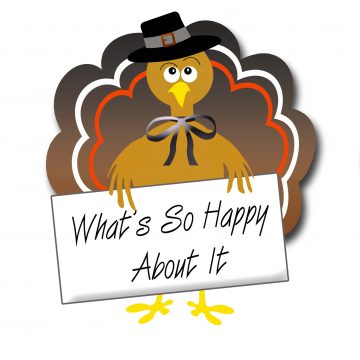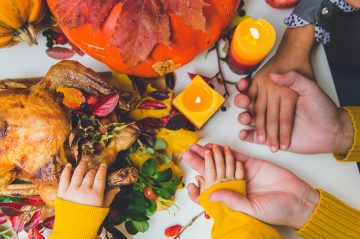 As families get ready to gather together for Thanksgiving dinner, many of my patients, students, and friends are worried about how they are going to handle an extended meal while maintaining a conversation with family members who have voted differently in the 2016 presidential election.
As families get ready to gather together for Thanksgiving dinner, many of my patients, students, and friends are worried about how they are going to handle an extended meal while maintaining a conversation with family members who have voted differently in the 2016 presidential election.
If there are no ground rules, will there be an acrimonious fight if politics is discussed? If everyone agrees not to talk about the election, will the elephant in the room create a tense, artificial atmosphere? Is it too late to call the whole thing off?
Post election angst cuts across all ages, as I’ve seen in my own therapy practice: The day after the election, a 5 year-old girl drew a picture of a stick-figured family with a sad face on her mom and a smile on her father with the simple story, “They’re fighting all the time about the election.” An octogenarian called in tears to tell me that her children and grandchildren had just told her that they weren’t coming to her house for Thanksgiving. They said, “We need a safe haven and there will be too much tension.”
I’ve been grappling with how to think about my own Thanksgiving dinner, and how to talk with my patients about their family dinners. As I think about the guests invited to share my table, I’m not even sure how everyone voted. I’m not going to poll people to find out, but I’d be lying if I didn’t confess feeling a bit on edge: I wonder if I can create a table that is big and welcoming enough to include those who are feeling hopeful about the election results, and others who are feeling frightened and upset.
For some families for whom the tension is extremely high, it may be the best decision to call off a Thanksgiving dinner with extended family. Less than 3 weeks does not offer much time to heal. But, for some families, sharing a time-honored, cherished ritual may be the first step toward creating a bridge.
Here are some ideas I have to help you go ahead with your turkey and fixings:
Think of family as a stew pot.
Consider that most of us live in a bubble — at work, in neighborhoods and especially on social media — with like-minded people. But family is a stew pot and one of the few places where we will be confronted with different points of view. It’s where many of us first really came to know and love someone who is gay or a relative with a different religion, or from a different country.
With that in mind:
- Could Thanksgiving be the start of empathy, of being curious about a family member’s unfathomable vote? Starting your inquiry with “I’m really curious about” or “Could you share with me…?” might open up a conversation you’ll be glad you had.
- If that is too tall an order, given that wine will be flowing and that such difficult conversations will be made more difficult in a big group setting, make Thanksgiving an opportunity to suggest a conversation at a later date. “I’d like to talk with you about the election, so that I can learn what is at the heart of your political beliefs. When can we meet?”
 Broaden the perspective to include history.
Broaden the perspective to include history.
This isn’t the first time in the history of our country that we have embroiled in high-stakes conflict and facing such polarization at Thanksgiving. Abraham Lincoln issued a proclamation for a national celebration of Thanksgiving in the depths of the Civil War, in an effort to “heal the wounds of the nation.”
During the Great Depression, Thanksgiving was set to fall on the fifth Thursday of the month, deemed too close to the holiday shopping season for retailers worried about sales. Roosevelt moved Thanksgiving to the 4th Thursday with 32 states following a Democratic Thanksgiving, and 16 adhering to a Republican Thanksgiving.
I wonder how families made sense of this. Did they have two turkey dinners or split family gatherings along political lines?
Given this historical perspective, talking politics through the lens of time travel may be less charged than talking about the current election. When kids know their family stories they grow up to be more resilient, and knowing that family members have survived and learned from other turbulent times, can be very reassuring.
- Who remembers the first vote they cast? For whom did you vote?
- Can you remember other times in history when you felt that the nation was polarized? (Perhaps Nixon’s 49-1 victory over George McGovern in 1972?) How did you move forward?
- Does anyone recall Thanksgiving 1963, only 6 days after President Kennedy’s assassination? What was that Thanksgiving like in your household?
- Did anyone here have holiday conversations with family during the Vietnam War?
- Does anyone have stories about their involvement in the Civil Rights movement or other significant human rights movements?
Try to keep your equilibrium (and everyone else’s).
Consider taking a break during the dinner to take some deep breaths, or even consult an app, like the Virtual hope box, which has tools—muscle relaxation, music, inspirational quotes, and positive thinking–to help people with coping. While it was designed as an accessory to therapy for patients who want help with stress outside of sessions, it’s free and can be useful to anyone, whether they are in therapy or not.
If you’re hosting dinner:
- You might want to send a group email ahead, setting an expectation that discourages conflict. For example, you might ask family members to focus on what we feel thankful for (as long as it’s not the outcome of the election), or what we love about our family.
- Suggest that everyone switch seats between courses. That way, if there is a particularly stressful pairing at the table, you’ll be disrupting and resetting it so that no one has to be stuck in a difficult conversation for the whole meal.
- Be proactive about creating a family-wide conversation. Last year, during arguably easier times, I invited my Thanksgiving guests to play a game aimed at creating one conversation around the table, and giving everyone a chance to connect. The game was simple but powerful, and I encourage you to play The Hat Game at your table this year. The answers can lead to some surprising and interesting conversations.
 Keep conversation civil at the table.
Keep conversation civil at the table.
- If the election is raised, you might ask these questions: “Do you want to have this conversation right now? Can we agree not to name-call, interrupt or use hot button words that will inflame?”
- If you are the one to bring up the election, you might take a moment to think of someone who has listened to you really openly and try to channel them as you ask in as open-hearted and curious a way as you can muster: “I’d really like to understand, what was most important to you during this election? What in your life experience has made these beliefs so important to you? Is there anything about your vote that you are uncertain about or question? Is there anything about the other party or candidate that you admire?”
 Don’t forget the fun.
Don’t forget the fun.
Despite the seriousness many of us are feeling right now, Thanksgiving should be an opportunity to gather and enjoy one another’s company. With a group of guests, it’s possible to play some wonderful games to inject a note of lightheartedness (and even silliness!) into your meal. In addition to the game I recommended above, you might grab the chance to play some classic games that are easier to play with a large gathering than at a small family dinner. Some examples are Telephone, Celebrity, or Charades, or make a “family charades” version where guests have to act out favorite family memories for others to guess. And there are plenty of other great table game ideas in our Thanksgiving Games index and our Dinner Games archive!
As I think about this upcoming holiday, I keep thinking of a Thanksgiving table in 1863, with a family whose two sons are both off at war — one fighting for the Union and the other for the Confederate side. I can’t quite imagine how that dinner conversation transpired. But I do know that deep rifts across our country, echoed in our families, are also an American tradition, just as established as eating turkey and potatoes on the fourth Thursday of November. Even so, I wish you and your family, in the words of Lincoln’s Thanksgiving proclamation, “the full enjoyment of peace, harmony, tranquility and Union.


 Anne Fishel is an Associate Clinical Professor of Psychology at the Harvard Medical School and the Director of the Family and Couples Therapy Program at Massachusetts General Hospital. She has lectured and written about the benefits of family meals.
Anne Fishel is an Associate Clinical Professor of Psychology at the Harvard Medical School and the Director of the Family and Couples Therapy Program at Massachusetts General Hospital. She has lectured and written about the benefits of family meals.